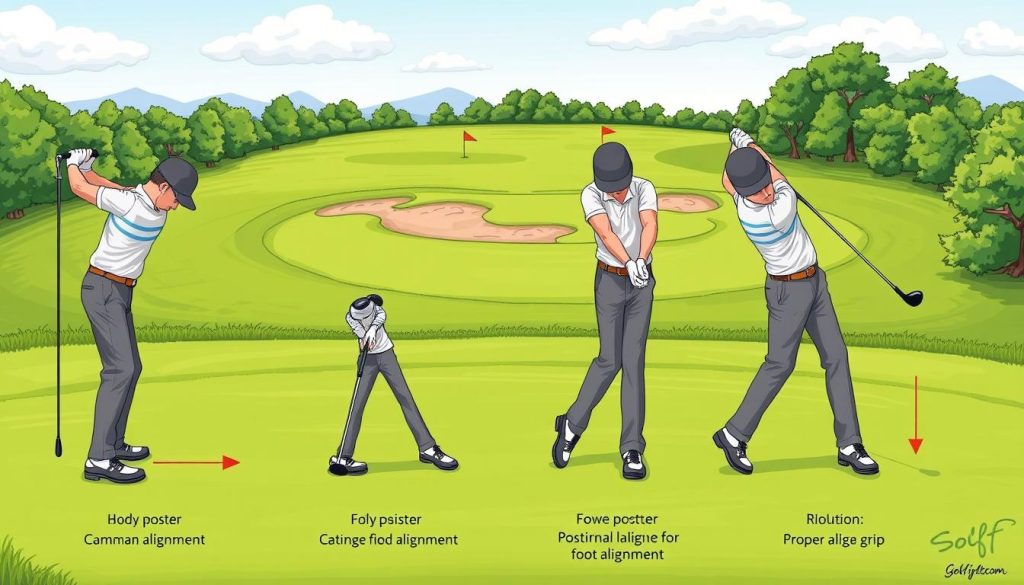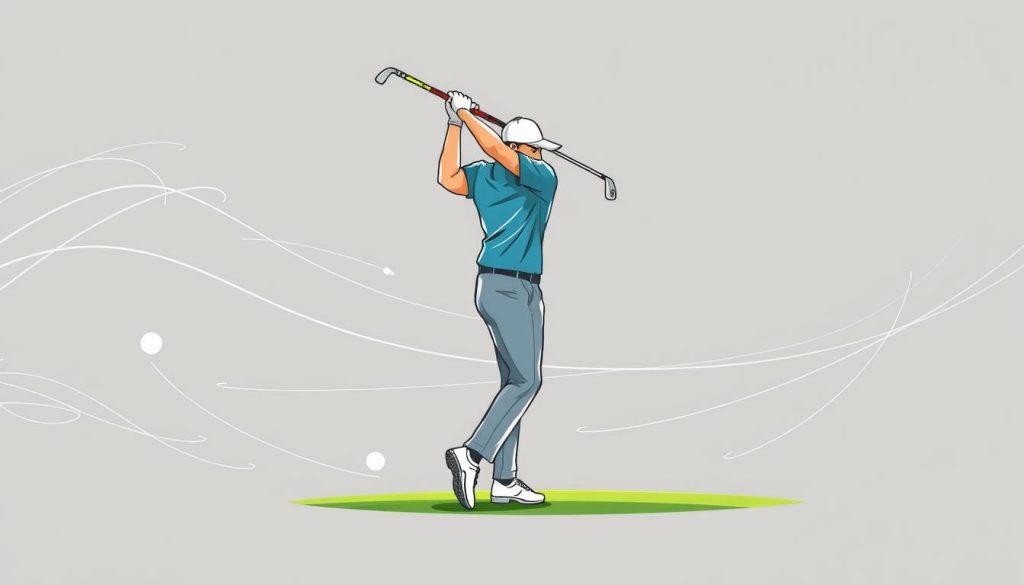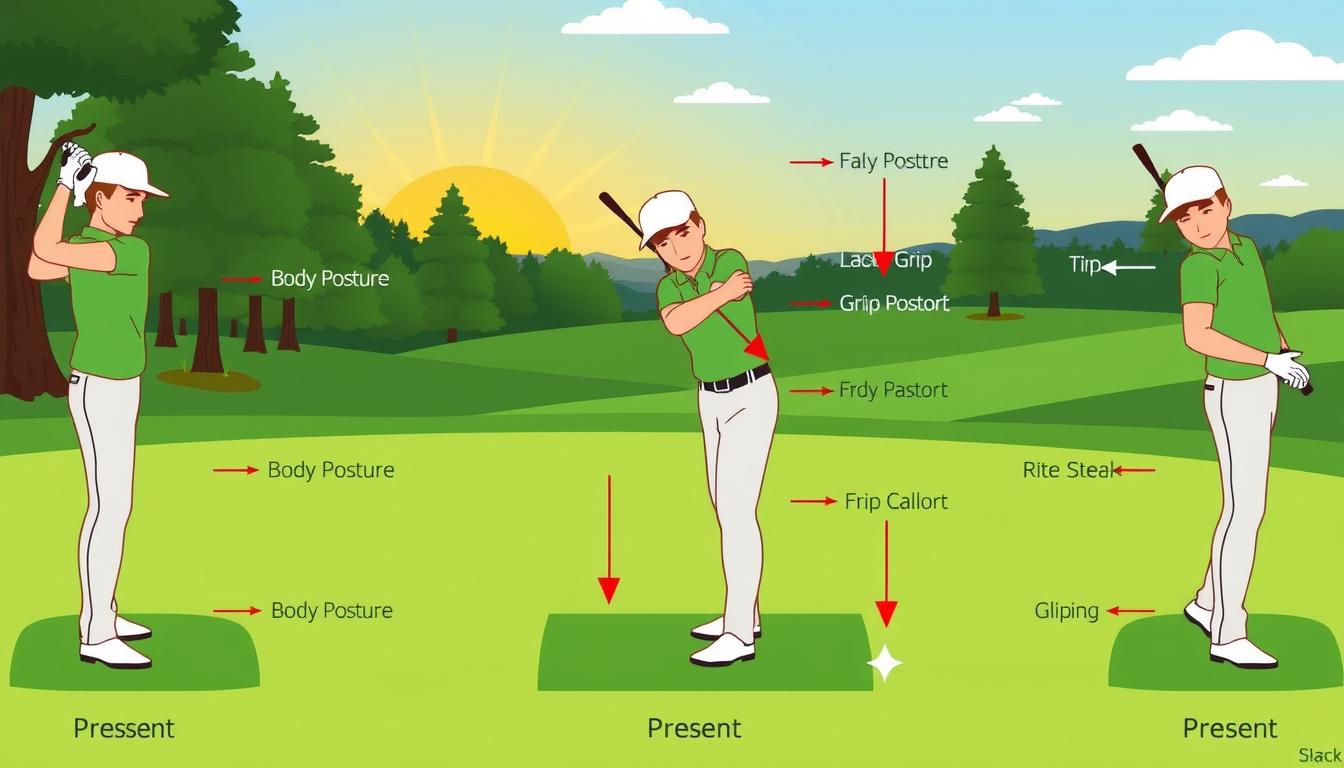Mastering golf swing mechanics starts with proper alignment. Your golf posture alignment sets the foundation for a successful shot. This guide will help you understand the key elements of a proper golf stance and how it impacts your game.
Golf alignment affects everything from your body positioning to your swing path and ball flight. By focusing on correct alignment, you can improve your accuracy and consistency on the course. Let’s dive into the essentials of golf swing alignment to help you lower your scores.
One crucial aspect of alignment is adapting to your physical characteristics. Taller players often need longer clubs, while shorter golfers require shorter ones. A common method to determine the right club length is measuring the distance from your wrist to the floor while standing upright.
Remember, even if your feet and hips are correctly aligned, your shot can still go off course if your shoulders aren’t parallel to the target line. Paying attention to all aspects of your body alignment is key to a successful swing.
Key Takeaways
- Proper alignment is fundamental to golf swing mechanics
- Your golf posture alignment affects shot accuracy and consistency
- Club length should be tailored to your height for optimal performance
- Shoulder alignment is as crucial as feet and hip positioning
- Consistent practice of alignment techniques can significantly improve your game
Understanding the Fundamentals of Golf Alignment
Golf swing alignment is crucial for hitting the ball well. Learning this skill can greatly improve your game. Let’s explore the key elements of a good golf swing alignment guide.
The Role of Body Position
Your body position is the base for a great shot. Stand with your feet shoulder-width apart, parallel to the target line. This stance helps you stay balanced and powerful.
For longer clubs, like drivers, make your stance a bit wider. Shorter clubs need a narrower base.
Target Line Basics
The target line is your guide to success. It’s an imaginary line from your ball to your target. Make sure your feet, hips, and shoulders are aligned with this line.
This setup helps you swing in the right direction. It boosts your chances of hitting your target.
Impact of Proper Setup
A proper setup is key for consistent ball striking. First, align your clubface to the target. Then, position your feet and shoulders correctly.
This order keeps everything in sync. Don’t forget about your grip. A neutral grip with two knuckles showing can help control your club.
| Club Type | Ball Position | Stance Width |
|---|---|---|
| Driver | Inside lead foot | Wider than shoulders |
| Irons | Center to forward | Shoulder width |
| Wedges | Center of stance | Slightly narrow |
By mastering these basics, you’ll lay a strong foundation for your golf swing. Regular practice will improve your accuracy and consistency on the course.
The Science Behind Ball Flight and Alignment
Golf swing analysis shows us how ball flight works. The angle of the club’s face at impact is key. It decides 75-95% of the ball’s initial direction for right-handed players. This fact changes what we thought about swing path.
Knowing how clubface angle and swing path work together is crucial. There are nine different ball flights in golf. These come from mixing face angles (closed, square, open) and swing paths (in-to-out, square, out-to-in). Understanding these combinations can help golfers diagnose their shots and make adjustments to improve their game. Developing consistency in matching your swing path with the desired clubface angle is key to mastering ball control. Incorporating golf swing flexibility tips into your training routine can also enhance your ability to execute varied shots by increasing your range of motion and control throughout the swing.
https://www.youtube.com/watch?v=eOdXV0f-XLg
- Face angle: Primary determinant of initial ball direction
- Swing path: Influences shot curvature relative to face angle
- Launch angle: Affects trajectory, varying by club type
- Ball speed: Determines distance traveled
- Spin rates: Impact trajectory and direction
Tools like the Alignment Disc can help improve your swing. To hit a fade, aim the clubface left of your target. Make sure your swing path is even further left.
| Factor | Impact on Ball Flight |
|---|---|
| Drag | Slows ball speed during flight |
| Lift | Determines height of ball trajectory |
| Weight | Affects overall distance and flight characteristics |
| Compression | Influences lift and overall ball performance |
Understanding these principles helps you fix swing issues. This leads to better performance on the course.
Golf Swing Alignment Guide
Mastering golf posture alignment is key to improving your swing plane. A solid foundation starts with the perfect stance. This stance ensures your shoulders, hips, and knees work together for optimal performance.
Setting Up the Perfect Stance
Your feet should be shoulder-width apart, creating a stable base. This positioning allows for better balance and power transfer during your swing. Remember, a proper stance is the first step towards swing plane improvement.
Shoulder Alignment Techniques
Align your shoulders parallel to the target line. This crucial aspect of golf posture alignment helps guide your swing path. Proper shoulder positioning can significantly impact your shot accuracy and distance.
Hip and Knee Position
Your hips and knees should follow the same alignment as your shoulders. This synchronization creates a cohesive body position, essential for maintaining a consistent swing plane. Pay attention to your knee flex, as it affects your ability to rotate smoothly through the swing.
| Alignment Element | Correct Position | Impact on Swing |
|---|---|---|
| Feet | Shoulder-width apart | Improves balance and stability |
| Shoulders | Parallel to target line | Guides swing path |
| Hips | Aligned with shoulders | Enhances rotation and power |
| Knees | Slightly flexed | Facilitates smooth rotation |
By focusing on these key elements of golf posture alignment, you’ll be well on your way to achieving swing plane improvement. Practice these techniques regularly, and you’ll see a noticeable difference in your game.
Common Alignment Mistakes and Their Solutions
Golf alignment is key to hitting the ball well and fixing your swing. Many golfers face alignment problems that hurt their game. Let’s look at common mistakes and how to fix them to improve your swing.
Open Stance Issues
An open stance means your body is too far left for right-handed golfers. This can cause slices and less power. To fix it, aim to line up your body with the target line. Use sticks on the ground to check your alignment.
Closed Stance Problems
A closed stance means your body is too far right for right-handed golfers. This can lead to hooks and mess up your swing. To correct it, slowly open up your stance. Use a mirror to see if you’re aligned right before you hit.
Shoulder Misalignment Fixes
Shoulder misalignment can mess up your swing, making it too high or too low. To fix it, keep your shoulders even with the target line. Practice with a club across your chest to check your shoulders.

| Alignment Issue | Problem | Solution |
|---|---|---|
| Open Stance | Slices, reduced power | Align body parallel to target line |
| Closed Stance | Hooks, altered swing path | Gradually open stance |
| Shoulder Misalignment | Over-the-top swings, inside takeaways | Keep shoulders parallel to target line |
Fixing these common alignment mistakes will help you hit the ball better. Make sure to check your alignment before every shot. This will improve your game on the course.
Tools and Equipment for Improving Alignment
Mastering golf alignment is key to improving your game. The right tools can greatly enhance your golf swing analysis and performance. Let’s look at some essential equipment for perfecting your alignment and boosting your skills.
Alignment sticks are a golfer’s best friend for perfecting posture and swing path. These tools help you see your target line and ensure proper body positioning. Many golfers see big improvements in their swing consistency with alignment sticks.
Alignment discs are also valuable for improving alignment. These portable devices guide your foot placement and help keep your stance right during your swing. Regular use of alignment discs can greatly improve your swing mechanics.
For advanced analysis, swing video lessons are popular. These lessons use high-speed cameras to show your swing in detail. Instructors can then give precise feedback on your alignment and technique. Seeing your swing in slow motion helps many golfers spot and fix alignment issues.
Choosing the right golf balls is also crucial. Soft balls with low spin can help manage alignment issues by reducing side spin. Harder balls with higher spin rates might make alignment problems worse. Trying different ball types can improve your performance and consistency on the course.
By adding these tools to your practice routine, you’ll be ready to tackle alignment challenges. This will help take your golf game to the next level.
The Connection Between Mental Game and Alignment
Your mental state is key in golf. A focused mind helps you position your body better and hit more accurate shots. Let’s see how you can use your mind to get better at golf.
Visualization Techniques
Visualization is a strong tool in golf. Before you hit, imagine your perfect swing and where the ball will go. This mental practice helps you line up your body and club right.
Imagine breathing in cool air and letting go of thoughts. This can slow down your breathing, making you calmer and more focused.
Pre-shot Routine Development
Having a set pre-shot routine is important for keeping your alignment right. Look at the course, pick your club, and practice your swing. Focus on the outside things, not how you swing.
This helps you stay in the moment and avoid getting too caught up in your swing. It keeps your alignment steady.
Concentration Methods
Keeping your focus is crucial for good alignment. Try “Breath Watching.” Find a quiet spot and breathe deeply for 10 breaths through your nose. This can calm your heart and help you concentrate better.
Most golfers think others notice their game more than they do. So, stay relaxed and keep your focus on your game.
| Mental Technique | Benefit for Alignment | Practice Time |
|---|---|---|
| Visualization | Improves body positioning | 1-2 minutes before each shot |
| Pre-shot Routine | Enhances consistency | 30-60 seconds per shot |
| Breath Watching | Increases focus | 10 minutes daily |

Using these mental tricks in your golf practice can make your alignment better. Golf is as much a mental game as it is physical. Stay present, focus on what you can control, and let your mind guide your body into perfect alignment.
Advanced Alignment Techniques for Different Shots
Learning advanced alignment techniques is key for better swing plane and golf swing analysis. These skills help you adjust your stance and clubface for different lies and conditions.
To hit a fade, align your body a bit left of the target with a square clubface. This makes your swing path go out to in, giving the ball clockwise spin. For a draw, align right of the target with a square clubface. This makes your swing path go in to out.
When playing uphill, widen your stance and align your shoulders with the slope. This keeps you balanced and helps you hit solid shots. For downhill lies, narrow your stance and align your shoulders with the slope. This helps you avoid hitting behind the ball.
Using alignment sticks in practice can really help. Golfers who practiced with them twice a week saw up to 30% better accuracy in six months. This simple tool is more effective than expensive simulators for improving your swing plane.
Remember, proper hip rotation is crucial for power and energy transfer. Keep a 90-degree angle between your forearm and clubshaft in the backswing. Start your downswing with your lower body for the best results.
Practice Drills for Perfect Alignment
Mastering your golf swing alignment is key to improving your game. Let’s look at some effective drills to help you achieve perfect alignment. These drills will boost your performance on the course.
Alignment Rod Exercises
Alignment rods are great for improving your swing alignment. The Train Tracks drill is a favorite among tour players. It involves setting up two rods parallel to each other, aimed at your target.
This setup helps you see the correct alignment and swing path. For chipping, try the Chip Without Flip drill. Place a rod behind the ball to keep your hands steady and ensure solid contact.
Mirror Work Techniques
Using a mirror is a great way to refine your technique and posture. Set up a full-length mirror at the driving range or in your home practice area. As you address the ball, check your stance, grip, and body alignment.
Pay close attention to your shoulder and hip positioning. The mirror gives you instant feedback. This allows you to make adjustments and develop muscle memory for proper alignment.
Video Analysis Methods
Adding swing video lessons to your practice routine is very helpful. Set up a camera or smartphone to record your swings from different angles. Review the footage to analyze your body rotation, clubface control, and swing plane.
Look for areas that need improvement, like hip rotation or weight distribution. Many golf apps offer tools for frame-by-frame analysis. This helps you identify and correct alignment issues. Remember, consistent practice will lead to better alignment and more accurate shots.
FAQ
Why is proper golf alignment important?
What does body alignment in golf involve?
How does alignment affect ball flight?
What constitutes a perfect stance in golf?
What are some common alignment mistakes and their solutions?
How can I use alignment sticks to improve my golf swing?
How does the mental game affect golf alignment?
Are there advanced alignment techniques for different types of shots?
What are some effective practice drills for improving alignment?
How can I use video lessons to improve my golf swing alignment?
Source Links
- https://stix.golf/blogs/rough-thoughts/golf-alignment-aiming-beginner-golfers-guide?srsltid=AfmBOoreTI8SngDndBCcBlRxVBTAhd2xi4K5nclDq1C7p_DcM2M_3xXQ
- https://eyelinegolf.com/products/practice-t-with-mirror?srsltid=AfmBOop-hfw6sW4puO3NUo6PRZz0q_DQpdTUVAocF7jNBGxBMp-wtETd
- https://swingtrainer.com/blogs/instruction/golf-swing-basics?srsltid=AfmBOoox78usIygzrumC-uNKJ9ltJ6Jc9F14G9Ymskotkvogs24VeH3V
- https://stix.golf/blogs/rough-thoughts/golf-alignment-aiming-beginner-golfers-guide?srsltid=AfmBOopls5Er-v8xyjnmwJHlVf5nV2mPO3U5xLS80DfBQvevAosrSlCM
- https://lilyfieldphysio.com.au/blog/uncategorized/mastering-golf-swing-step-by-step-guide/
- https://whygolf.com/blogs/whysguyscorner/golf-ball-flight-laws?srsltid=AfmBOooQa_MRAFodPtvGkbbtwZUW-15RcQnB3uAxr8CC40wY2nkAuyPN
- https://hackmotion.com/golf-ball-flight-laws/
- https://stix.golf/blogs/rough-thoughts/golf-alignment-aiming-beginner-golfers-guide?srsltid=AfmBOoohPnCIiUZSl9AH5X4RzAmO9i4hrXRZQLub89oUsIP4vZ8gL8g1
- https://eyelinegolf.com/products/practice-t-with-mirror?srsltid=AfmBOopXxBqBO0o4ly2HZaDPmxpJ-hhRom0TXZ6c9Ybjhenls2V0vqjw
- https://whygolf.com/products/alignment-disc?srsltid=AfmBOoqlMT-QjKLO6EL4MoIBlc7rLXUnCdno8T2IK_tDzkSwKqiFtUYv
- https://hackmotion.com/common-golf-swing-mistakes/
- https://collegeofgolf.keiseruniversity.edu/the-biggest-mistakes-you-are-making-with-your-golf-swing/
- https://www.performancegolf.com/blog/golf-for-beginners-most-common-mistakes-and-how-to-fix?srsltid=AfmBOopZclv3qd3kuZ7H2P8yZzoXWvN8YUL5M5ZK98nq4mVQfQo1wKEY
- https://www.golfballs.com/blog/tools-to-aid-golf-alignment/?srsltid=AfmBOooX8Hi251E2Pom6qDLiXryzcXnMXxGbNSe9gdruO1O4uk6-1yCP
- https://whygolf.com/?srsltid=AfmBOoqHdrdqMvwNR2AENcbPcDez56q0gIRPkMGtPXrfzSCEKHaRMmFd
- https://www.golfmonthly.com/best-golf-deals/best-golf-training-aids-137815
- https://rotaryswing.com/golf-instruction/mentalgolfgame/mental-golf-game-introduction
- https://golf.com/instruction/9-ways-improve-golf-mental-game-jon-sherman/
- https://stix.golf/blogs/rough-thoughts/golf-alignment-aiming-beginner-golfers-guide?srsltid=AfmBOoo2qSW3E6LYlAAy3cX1H0Tx6-U3nMzYUsZRNcFAAp8GeUxPE_dt
- https://www.marygrovemustangs.com/perfecting-your-swing-advanced-techniques-for-serious-golfers.html
- https://nationalgcla.com/the-alignment-stick-drill-perfect-your-swing-path/
- https://hackmotion.com/alignment-stick-drills/
- https://cattailcrossing.ca/blog/simple-drills-for-optimizing-golf-swing-alignment/
- https://swingtrainer.com/blogs/instruction/golf-alignment-sticks?srsltid=AfmBOor17A0MnrjGNgVOR5IrlhWYGl7HXR6Vnwz37vUTBTPqp3tql6cW


